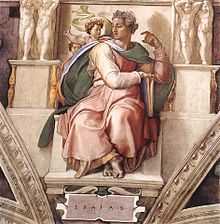Isiah
| Isaiah | |
|---|---|

Fresco from the Sistine Chapel ceiling by Michelangelo
|
|
| Prophet | |
| Born | 8th century BCE Judah (?) |
| Died | 7th century BCE |
| Venerated in |
Judaism Christianity Islam |
| Feast | May 9 |
Isaiah (US: /aɪˈzeɪ.ə/ or UK: /aɪˈzaɪ.ə/;Hebrew: יְשַׁעְיָהוּ, Modern Yeshayahu, Tiberian Yəšạʻyā́hû; Syriac: ܐܹܫܲܥܝܵܐ ˀēšaˁyā; Greek: Ἠσαΐας, Ēsaïās; Latin: Isaias; Arabic: إشعيا As̲h̲aʿyāʾ or S̲h̲aʿyā; "Yah is salvation") was the 8th century BCE Jewish prophet who gave his name to the Book of Isaiah.
The exact relationship between the Book of Isaiah and any such historical Isaiah is complicated. The traditional view is that all 66 chapters of the book of Isaiah were written by one man, Isaiah—possibly in two periods between 740 BCE and c. 686 BCE, separated by approximately 15 years—and includes dramatic prophetic declarations of Cyrus the Great in the Bible, acting to restore the nation of Israel from exile in Babylon. One widespread view sees parts of the first half of the book (chapters 1–39) as originating with the historical prophet, interspersed with prose commentaries written in the time of King Josiah a hundred years later; with the remainder of the book dating from immediately before and immediately after the end of the exile in Babylon, almost two centuries after the time of the original prophet.
...
Wikipedia
